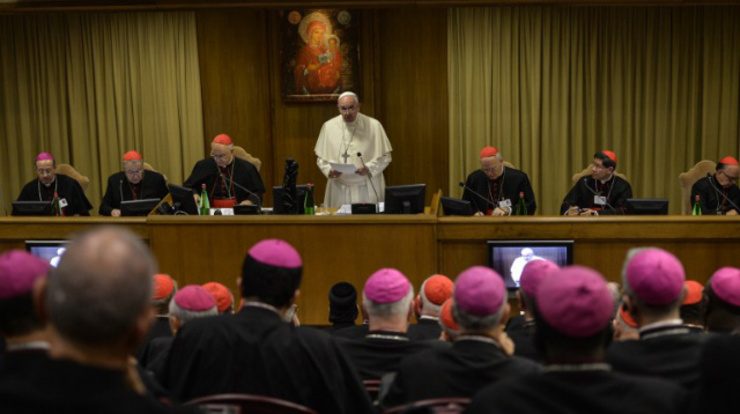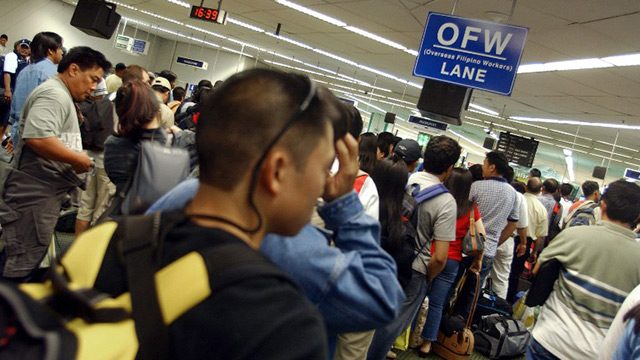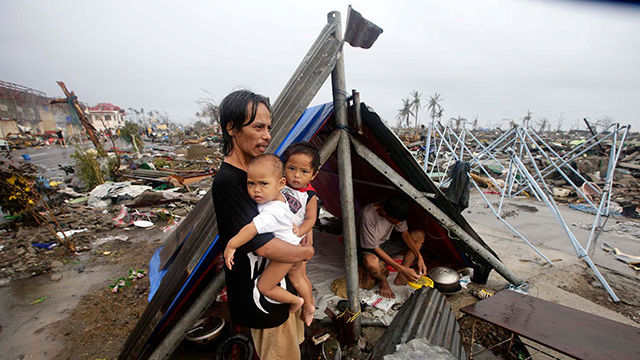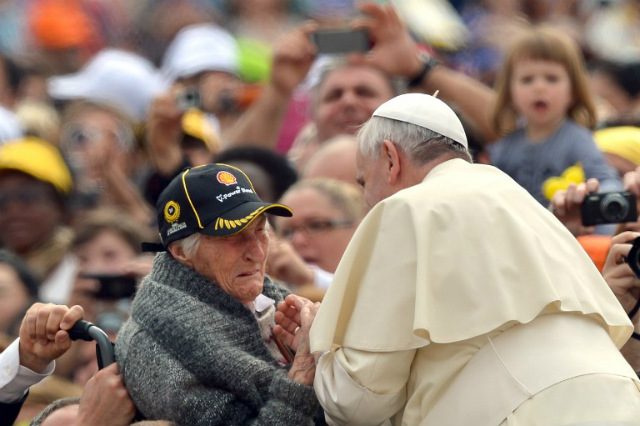SUMMARY
This is AI generated summarization, which may have errors. For context, always refer to the full article.

MANILA, Philippines – When Pope Francis visits the Philippines from January 15 to 19, he will meet and hear the testimonies of Filipino families experiencing the most pressing challenges – poverty, overseas Filipino workers (OFWs), and persons with disabilities.
Families have always been on top of the Argentinian pontiff’s priorities. In October 2014, Pope Francis showed his concern for the Christian family after he convened an Extraordinary General Assembly of the Synod of Bishops to discuss “pastoral challenges of the family in the context of evangelization.”
Two Filipino archbishops present in the synod – Manila Archbishop Antonio Luis Cardinal Tagle and Lingayen-Dagupan Archbishop Socrates Villegas, who is also the president of the Catholic Bishops’ Conference of the Philippines – said the Pope’s meeting with Filipino families is necessary given the challenges faced by households in the predominantly Catholic nation.
According to Tagle, who was one of 3 presidents appointed by Pope Francis to guide the synod, archbishops agreed that there is a crisis of faith worldwide and families are most affected.
“So the question raised at the synod was, would a crisis or weakening of the faith have impacts on relationships and families? And what or effects would these be?,” the archbishop said.
For Tagle and Villegas, the following are the highlights of the synod:
1) Filipino families are ‘forced’ to separate due to migration
Migration due to economic reasons is often the reason families are separated in the Philippines. “In the Philippines, many married couples separate not because they hate each other. They choose separation because of their love for their family. And they bear the pain of separation just to find jobs elsewhere,” Tagle said.

The cardinal added that this poses a big challenge to the Catholic Church.
“The next question would be: What pastoral care should we provide for our OFWs so that they will remain faithful to their families left back home? And on the other hand, what can we do for those left behind so that they too remain faithful to their spouces or their parents who are abroad?”
Villegas noted, however, that poverty is not always the reason married people leave the country.
“In the Filipino psyche is a romanticized notion of the West as the land of opportunity accompanied by a deprecator assessment of the Philippine situation. It is not really poverty alone, nor perhaps principally, that sunders families. It is rather the idealization of the West as the land of promise,” Villegas said.
He said this is alarming since not all Filipinos who leave the country are impoverished. “This peculiarity of the national social psyche is threatening for it can only mean that not even the family is powerful enough a factor to keep Filipinos home,” Villegas said.
Pope Francis, whose own family left Italy for Argentina in the early 20th century, has repeatedly called for “the elimination of prejudices and presuppositions” in the approach to migration. This, in the face of increasing international movements that are often illegal. (READ: Pope Francis in the eyes of the Filipino)
2) Poverty affect families the most
According to Tagle, economic factors impact the Filipino more than anything else.
A recent survey conducted by SWS showed that over 52% of Filipino families or an estimated 11.4 million families considered themselves poor in the 4th quarter of 2014. The results also showed record-high levels of poverty thresholds in various regions. Poverty incidence in the country has remained the same since 2006.
Tagle said that for married people and those with families, the economic crisis could lead them to be more attached to their jobs than to their families.
“Challenges and pressures in job-seeking and in the workplace could lead to a perspective that spending time with the family is ‘wasting time,’ time which could otherwise be spent more productively on another part-time job or for extended work hours,” Tagle earlier said.

He added: “The present economic problem discourages some people from marrying. Even when they have already found a lifetime partner and they are ready to move into the next stage in the relationship, economic realities impact heavily on their decision to… start a family.”
Pope Francis stressed the importance of marriage and family as the next step for Christians’ personal growth. “It is necessary to reaffirm the conviction that every family is the principal setting for the growth of each individual, since it is through the family that human beings become open to life and the natural need for relationships with others,” he said in a speech addressing religious leaders in March 2013.
3) ’Irregular’ relationships, divorce are being debated
On his reflections after the synod, Villegas said Christians should exert genuine efforts to reach out to Filipino families in “irregular” relationships – those in live-in unions, de facto separation from spouses, and other partnerships.
“(They) must be helped by pastors particularly by the Sacrament of Penance, to follow the demands of true and unselfish love in the Spirit of the Gospel. We cannot presume to judge and condemn. Rather, the presumption should be that there is a genuine effort on their part to live according to the demands of our faith,” Villegas said.
He added: “The danger of scandal should never stand in the way of genuine charity, and the Catholic faithful must be reminded that much of what Jesus did was scandalous to the ‘righteous’ of his time.”
While divorce is not legal in the Philippines, many advocates are pushing for its passage. A report in April 2013 also showed that the number of Filipino couples seeking annulment is increasing. In 2012, some 10,528 annulment cases were brought before the Office of the Solicitor General.
Tagle said the issue was one of the main discussions during the synod, with Pope Francis publicly launching a review of the church’s laws on divorce and separation.
The Catholic Church’s view of marriage is seen by many as outdated. One of the most criticized law is how Catholics who divorce and remarry are not allowed to receive communion while those who repent from more lucrative crimes can.
“I am a firm believer that the Lord is risen and that his promise that his church will be guided by the Holy Spirit is true,” Tagle told the Catholic News Service regarding the deep divisions on the issue.
4) Homosexuals are ‘children of God’
Although the Church does not acknowledge gay marriage, Villegas maintained homosexuals must be respected. “Persons with homosexual orientation are sons and daughters of God, no less than any of us is. Discrimination against them is contrary to the Gospel spirit. Verbal and physical violence against them is an offense against the good lord Himself,” he added.
In the Philippines, gay marriage is a taboo. This prompts gay couples to be secretive of their relationships. But because of the gay rights movements in the US, the issue is being debated here.
The Vatican under Pope Francis has been reaching out to the grassroots about this. In November 2013, bishops were requested to get the pulse of parishioners on contraception, gay unions, divorce, among other issues.
Villegas added: “Through honest dialogue and pastoral accompaniment, it should be our goal to assist them to respond to the demands of chastity and that purity of body and heart.”
Pope Francis and the Filipino family

According to Pasig Bishop Mylo Vergara, the order came from the pontiff himself: he wants to have eye contact with Filipino families. The Pope “wants this event to be a real personal encounter” with families, including the poor.
Aside from his encounter with the families in MOA, Pope Francis will also have lunch with Yolanda survivors and meet with families of survivors – along with priests, consecretaed persons, and seminarians – in Palo Cathedral.
Looking at the Pope’s official itinerary, however, a Christian activist youth group called on the pope to move beyond pleasantries and make surprise visits to the poor and marginalized communities.
What specific message for Filipino families the Pope will give is not yet known. Christian families can guess, however, that it will shed light and hope on the challenges mentioned by the Filipino archbishops.
“One thing we are focusing on is his meetings with families and with young people in Manila. But even in those encounters he will listen to stories of families in difficulty, those who have suffered different typhoons in life, and he will listen to young people,” Tagle told Vatican Radio.
He added: “The Pope will listen and he will give them a word of comfort. But I hope for more: I hope that he, the Pope, will be strengthened in his own faith by these poor people.” – Rappler.com
Add a comment
How does this make you feel?
There are no comments yet. Add your comment to start the conversation.